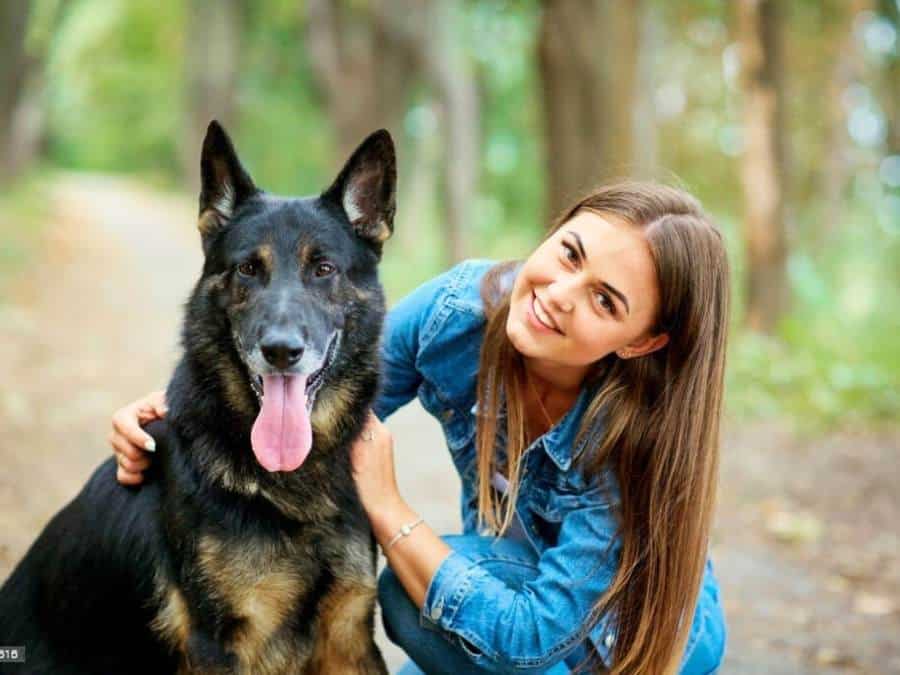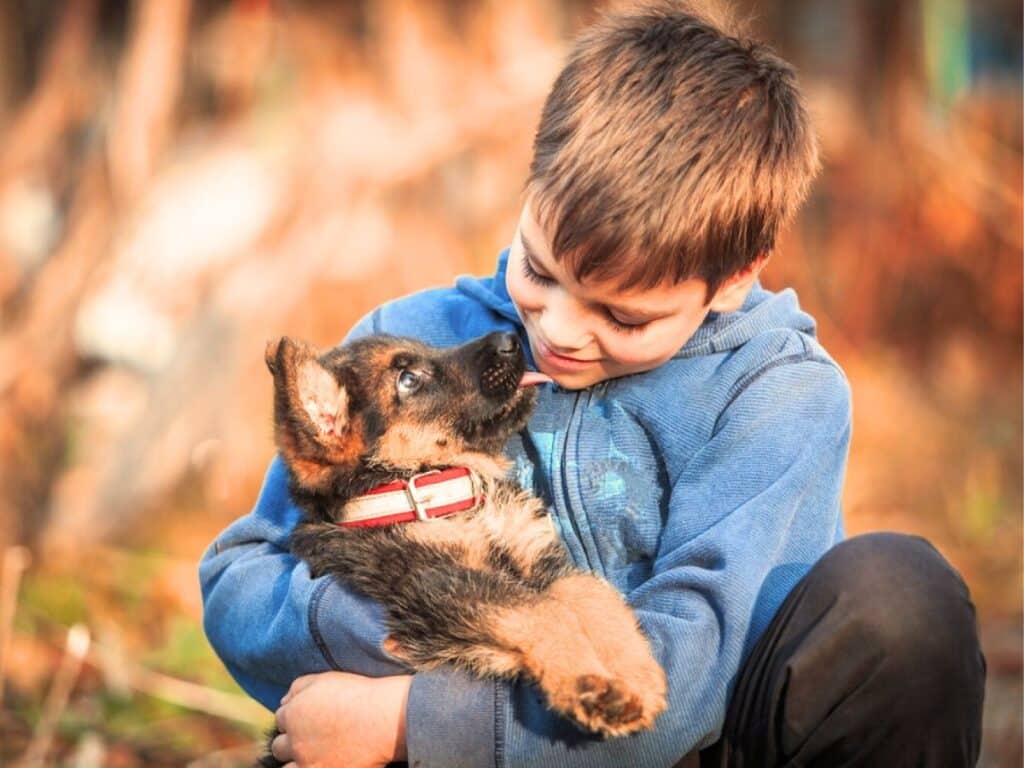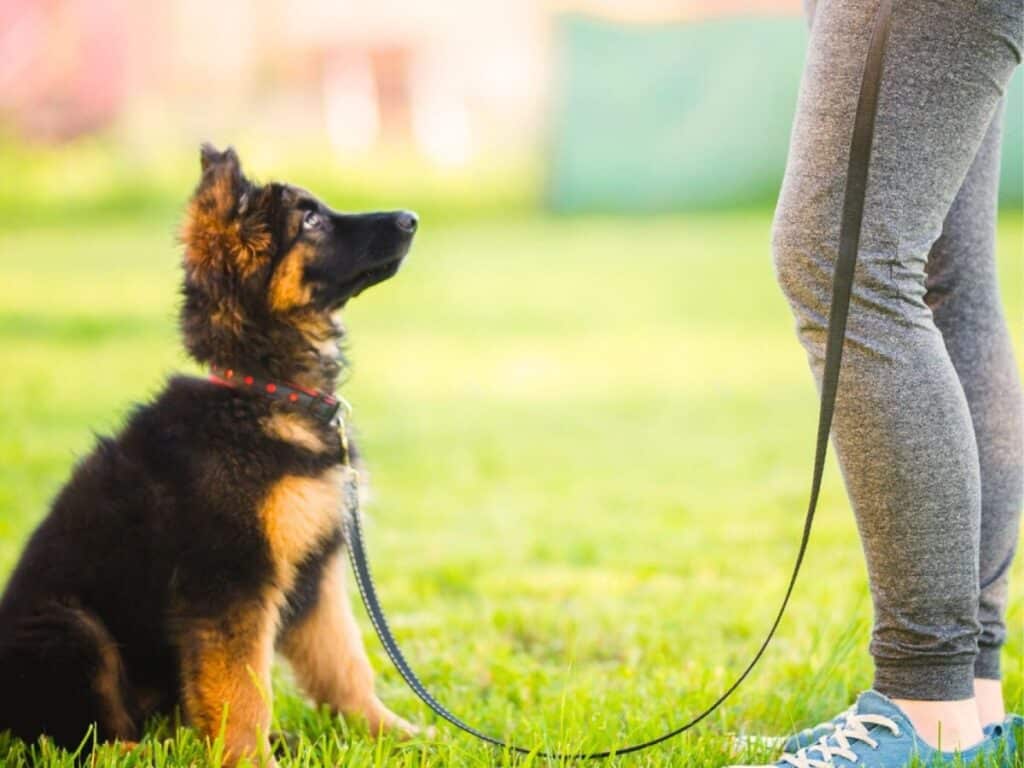Are German Shepherds easy to train? This is a question that has intrigued dog lovers for years. The approach you take can make all the difference.
The effectiveness of German Shepherd training lies in their innate intelligence and eagerness to please their owners. These magnificent creatures possess an exceptional ability to learn new commands quickly, making them one of the most trainable breeds out there. With consistent guidance and positive reinforcement, you’ll be amazed at how rapidly they grasp new concepts.
Are German Shepherds Easy To Train?
German Shepherds are generally considered easy to train due to their high intelligence, eagerness to please, and strong work ethic. Their intelligence allows them to grasp commands and learn new behaviors relatively quickly. They are receptive to positive reinforcement training methods, responding well to praise, treats, and rewards.
Additionally, their history as herding and working dogs has contributed to their ability to follow commands and work cooperatively with humans. Their natural instincts make them excel in obedience training.
However, it’s essential to recognize that individual dogs can vary in their temperament and learning abilities, even within the same breed. Some German Shepherds may be easier to train than others.
Consistency, patience, and a positive training approach are vital for successful training, especially during their early development stages.
Why Are German Shepherds Easy to Train

German Shepherds are considered easy to train primarily due to their combination of intelligence, trainability, and willingness to please their owners. Several key factors contribute to their ease of training:
1. High Intelligence
German Shepherds are renowned for their exceptional intelligence, which makes them quick learners during training sessions. Their sharp minds allow them to pick up new skills and behaviors faster than many other breeds.
German Shepherd breed ranks as the third most intelligent dog breed in the world. This means that they can quickly grasp complex concepts and follow instructions accurately.
2. Genetic Instincts
German Shepherds were originally bred as herding dogs, which means they have a strong instinct to gather, control, and move livestock. This herding instinct translates into a willingness to follow commands and work with their owners, making them responsive during training.
German Shepherds are pack-oriented animals, and as such, they tend to form strong bonds with their human families. This pack mentality fosters a desire to please their owners and work cooperatively with them, which makes training more effective.
3. Eager-to-Please Attitude

These loyal companions thrive on positive reinforcement and seek approval from their human counterparts. Their strong desire to make their owners happy makes them highly cooperative during training exercises.
German Shepherds have an inherent need for guidance and direction, which aligns perfectly with structured training routines. They genuinely enjoy being given tasks and fulfilling them successfully.
4. Work Ethic and Desire for Structure
These dogs thrive in environments where they have a clear purpose and routine. They excel when given tasks that align with their natural instincts, such as herding or search and rescue work.
Their innate drive to work and fulfill a role makes them highly receptive to training. German Shepherds appreciate the sense of order that comes with structured training sessions.
By providing a structured training program, owners can tap into their German Shepherd’s natural instincts and channel their energy effectively.
5. Loyalty and Devotion
These dogs form deep bonds with their owners, creating a strong sense of trust and respect. They genuinely want to please their humans, making them eager participants in any training activity.
German Shepherds have an unwavering commitment to their families, which translates into exceptional focus during training sessions. Their loyalty drives them to perform at their best, even when faced with challenging tasks or distractions.
How Long Does It Take to Train a German Shepherd?

Training a German Shepherd can take around 6 to 8 weeks for basic obedience commands like sit, stay, come, and leash walking. Advanced training for specialized tasks, such as service work or protection training, may take several months to a year or more, depending on the complexity and the trainer’s expertise.
Here are a few factors that can affect the training duration of a GSD:
1. Consistency, dedication, and individual dog temperament
Training a German Shepherd can be an exciting and rewarding experience. The duration of training, however, can vary depending on several factors such as consistency, dedication, and the temperament of your individual dog.
While some German Shepherds may pick up commands quickly, others might require more time and patience.
2. Basic obedience commands can be taught within a few weeks
When focusing on basic obedience commands such as sit, stay, come, and lie down, you can expect your German Shepherd to grasp these concepts within a few weeks of consistent training.
To teach these commands effectively, use positive reinforcement techniques such as treats or praise whenever your dog successfully follows the command. Repetition is key during this stage of training.
By practicing these commands daily for short periods of time (around 15-20 minutes), your German Shepherd will become familiar with the desired behaviors.
3. Advanced skills may require several months
Advanced skills could include agility training, scent detection, or even service dog training. It’s important to understand that teaching these advanced skills may require more time and ongoing reinforcement.
For example, agility training involves teaching your German Shepherd to navigate through obstacle courses with speed and precision. This type of training can take several months to master as it requires both physical and mental coordination.
Consistent practice sessions combined with positive reinforcement will help your dog excel in agility training.
Are German Shepherds Easy for Beginners to Train?

German Shepherds are generally considered to be a breed that is relatively easy to train, even for beginners. They are highly intelligent and eager to please, which makes them quick learners.
Additionally, German Shepherds have a strong work ethic and are known for their loyalty and obedience. These traits make them highly trainable and responsive to commands.
However, German Shepherds are also strong and energetic dogs with a protective instinct, so they require consistent and firm leadership from their owners. For beginners, this might pose some challenges as they need to establish themselves as the pack leader and set clear boundaries.
The key to successful training with a German Shepherd is to start early, use positive reinforcement techniques, and be patient and consistent in the training process.
Providing them with proper socialization and positive experiences from a young age can also make a significant difference in their behavior and temperament as they grow older.
RELATED: How To Stop German Shepherd Puppy From Biting
Are German Shepherds Easy to Potty Train?

Potty training a German Shepherd can be both manageable and challenging, depending on various factors, including the individual dog’s temperament, consistency in training, and the owner’s approach.
As a breed known for their intelligence and ability to learn quickly, German Shepherds can pick up potty training relatively fast if consistent and positive training methods are used. They are often eager to please their owners, which can work in favor of successful potty training.
However, German Shepherds are also known for their strong will and independence, which can lead to some challenges during the potty training process.
To make potty training more effective, it’s essential to establish a consistent schedule for taking the dog outside to eliminate, offer positive reinforcement (such as praise and treats) when they potty in the designated area, and be patient and understanding during the learning process.
Crate training can also be a helpful tool to prevent accidents indoors and to teach the dog to hold their bladder. (AKC)
When Should You Start Training a German Shepherd?

Training a German Shepherd should ideally begin early in their life, as soon as you bring them home, which is usually around 8 to 10 weeks of age. Starting training at a young age is crucial to establish good behaviors from the start and set the foundation for lifelong learning.
1. Begin socialization during the puppy stage
One of the key aspects of training a German Shepherd is socialization, which should commence during their puppy stage, typically around 8 weeks of age. This early age is ideal for introducing your furry friend to various people, animals, environments, and experiences.
During the socialization process, make sure your German Shepherd interacts with different types of individuals – children, adults, strangers – so they become comfortable around people from all walks of life.
2. Introduce basic obedience commands around 12 weeks
Basic obedience commands include “sit,” “stay,” “come,” and “down.”
When starting obedience training at this stage, keep sessions short but frequent to accommodate their young age. Puppies have limited concentration spans, so it’s important not to overwhelm them with lengthy training sessions.
3. House training
Potty training (house training) should start immediately to teach the puppy where it’s appropriate to eliminate. Consistency, a regular schedule, and positive reinforcement are essential for successful house training.
Potential Difficulties in Training a German Shepherd
Training a German Shepherd, while generally considered easier than some other breeds, can still come with its challenges. Here are some potential difficulties you may encounter when training a German Shepherd:
1. Strong-willed nature
German Shepherds are known for their strong-willed and independent nature. While this can make them excellent problem solvers, it may also lead to them testing boundaries and being less inclined to follow commands at times.
RELATED: German Shepherd Behavior Stages By Age
2. High energy levels
German Shepherds are high-energy dogs that require regular physical and mental stimulation. Without sufficient exercise and mental engagement, they may become restless and harder to focus during training sessions.

3. Socialization Issues
Early socialization is crucial for German Shepherds, but some may show signs of shyness or fearfulness towards unfamiliar people or situations. Proper socialization is essential to prevent potential behavioral issues later on.
4. Protective instincts
German Shepherds have a natural protective instinct, which can be a double-edged sword. While it can make them excellent guard dogs, it may also lead to over-protectiveness or suspicion of strangers if not properly managed.
5. Prey drive
Some German Shepherds have a strong prey drive, which means they may be inclined to chase after small animals or exhibit a high level of interest in moving objects. This instinct can make recall training and off-leash control more challenging.
6. Boredom-related behaviors
When not mentally stimulated or provided with adequate activities, German Shepherds may engage in undesirable behaviors like digging, chewing, or excessive barking.
7. Selective hearing
German Shepherds, like many intelligent breeds, may choose not to respond to commands if they perceive the task as uninteresting or if they detect inconsistency in the owner’s expectations.
8. Dominant tendencies
Some German Shepherds may exhibit dominant behavior, requiring confident and consistent leadership from their owners. Inexperienced or passive owners may face challenges in establishing themselves as the pack leader.
To overcome these potential difficulties, it’s important to:
- Start training early and be consistent in your approach.
- Use positive reinforcement techniques to motivate and reward good behavior.
- Provide regular exercise and mental stimulation to keep them engaged and focused.
- Socialize your German Shepherd puppy to various people, animals, and environments from an early age.
- Seek professional guidance if you encounter specific training challenges or need help with more advanced training tasks.
Conclusion
In conclusion, German Shepherds possess innate qualities that make them easy to train for both beginners and experienced trainers alike. Their intelligence, eagerness to please, loyalty, and work ethic contribute to successful training outcomes across various disciplines.
However, it is important to remember that training requires consistency, patience, and an understanding of the breed’s specific needs. Unlock the potential of your German Shepherd by providing proper training, mental stimulation, and a loving environment.
Frequently Asked Questions (FAQs)
1. How do I prevent my German Shepherd from pulling on the leash?
To prevent your German Shepherd from pulling on the leash, consider using positive reinforcement techniques such as rewarding good behavior with treats or praise when they walk calmly beside you. Using a front-clip harness or head halter can provide more control over their movements and discourage pulling.
2. Can German Shepherds be trained to get along with other pets?
Yes, German Shepherds can be trained to get along with other pets through proper socialization and gradual introductions. Start by exposing them to controlled interactions with other animals in a neutral environment. Reward calm behavior and supervise all interactions until trust is established between your German Shepherd and the other pets.
3. Are German Shepherds suitable for families with children?
German Shepherds can be excellent family dogs if properly trained and socialized. They are known for their loyalty and protective nature towards their loved ones. However, it is essential to teach children how to interact respectfully with dogs and supervise all interactions between young children and dogs to ensure safety for both parties.
4. How often should I train my German Shepherd?
Consistency is key. Aim for short but regular training sessions throughout the week rather than infrequent longer sessions. This helps maintain focus and prevents boredom or burnout. As a general guideline, aim for at least 15-30 minutes of daily training activities.
5. Can I train my adult German Shepherd new tricks?
Yes! While it may take slightly longer for adult dogs to learn new tricks compared to puppies, adult German Shepherds are still capable of learning new skills through positive reinforcement methods.
Learn more about German Shepherds




